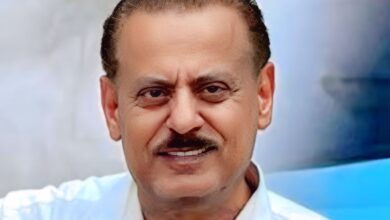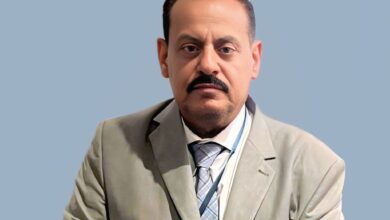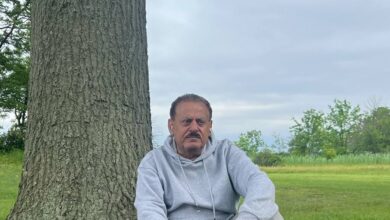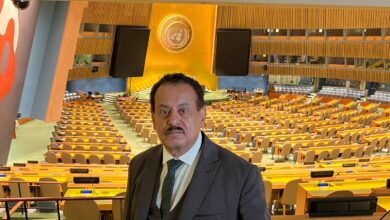The First Time I Boarded an Airplane
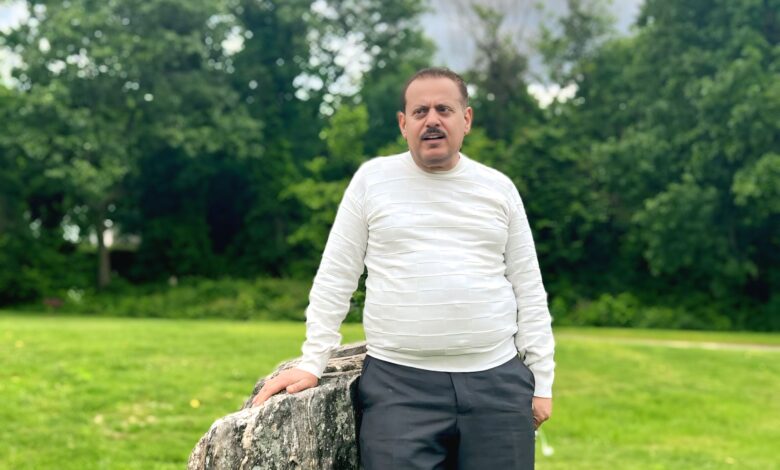
Yemeni mp
Ahmed Saif Hashed
It was the first time I saw an airplane up close, boarding it via a ladder I wasn’t sure was independent or part of the aircraft itself. I settled into my designated seat, and by good fortune, it was next to the window. The plane moved slowly across the airport tarmac, and the instructions to fasten our seatbelts were issued. The flight attendant passed by to ensure that the passengers adhered to these instructions, while I had already managed to overcome my clumsiness in fastening the belt. The plane began to accelerate on the ground, gaining speed more and more, as I, like a child, watched the details of my surroundings through the window. Then, the aircraft took off from Aden International Airport.
As the plane ascended, I felt a surge of anxiety. A vast void seemed to fill my chest, larger than my own body, as expansive as the sky the plane was piercing through in its ascent. My heart felt as if it might leap from its place, engulfed by a profound tension.
Nothing holds you now as you ascend into the heavens in an airplane. You feel as though your spirit is grasped solely by fate. The fate of the seventy diplomats and crew members who perished in a plane crash in the early seventies in Aden crossed my mind, or perhaps the one that was blown up by a malicious hand… a heinous crime by any measure. I imagined their terrifying end, scattering through the air like shrapnel from a bomb. What dreadful and horrifying luck.
Despite the fear that coursed through my veins and seized my being, I tried to muster my courage, while my curiosity proved stronger than both my anxiety and fear. I began to talk to myself: I must suppress my fears. I must overcome my anxiety. Today, I have become an officer; how can I encourage my future soldiers to be brave and valiant? How can I call upon them to be fearless while I am gripped by such terror? Isn’t it Che Guevara, the figure I admired, who said that a revolutionary or leader is “the last to sleep and the first to wake, the last to eat and the first to die”? A leader should not fear death, let alone be paralyzed by anxiety.
I sought to bolster my resolve and strengthen my will against the phobia that toyed within me, conversing with myself: “My brother Ali Saif Hashed was a parachutist who jumped from planes; how can I be less than him? I want to be as brave as he was…” I then recalled a story he once shared about a man who refused to jump from the plane until he received a strong kick from the foot of an Egyptian officer.
I continued to speak with myself: “I don’t want to be a coward, nor do I need a kick to learn courage. A coward is more shameful than one who is kicked by every foot. I must be brave enough to overcome this complex. I need to crush this fear that grips me. I must unleash my curiosity that challenges and deserves admiration. I should savor, as much as I can, the view of this fantastical world from this great height…”
* * *
I pressed my cheek and side of my face against the glass of the window beside me and told myself: I must see the world below from this lofty altitude. I want to know how the earth appears to the eye from the sky! I must know how Aden looks from this height! It’s my first time seeing the city of Aden from such an elevation—the streets, buildings, ships, sea, beaches, and its overall geography. Then Aden shrank and faded behind us as the plane devoured the distances, while I barely felt the speed of the aircraft, except gradually, as I noticed what was ahead fading behind us.
For the first time, I found myself above the clouds. To be higher than the clouds, or to see them beneath you from above, fills you with wonder and awe. It captivates your attention with what you have never known or seen before. What magic it is to see the clouds below you, spread like cotton scattered in thick layers across vast, fantastical expanses. Viewing the clouds from above is different from seeing them from below; it feels as if you are discovering your world for the first time or anew.
I am now discovering the difference. I drift into imagination and wishful thinking, often surpassing the bounds of reason. I wished that the clouds were indeed made of cotton, to cushion us if the plane were to fall for any reason. Their appearance was tempting and alluring, but I quickly reminded myself: “What a deceptive sight…” The clouds look like layers of soft cotton, but the reality is striking. It reflects the behavior of many politicians who deceive their people with grand promises, ascending to high ranks from which they govern those below, only for the people to discover their great delusion, having fallen from a great height and crashing into a hard reality, resulting in catastrophic consequences.
I also recalled a tale I heard in my childhood about a fool who wanted to ride a mule and fell from a height, getting stuck in “Al-Areeb” tree, summarizing his plight and experience with the words: “If it weren’t for Al-Areeb tree… my Lord would have been merciful.”
My curiosity refused to sleep or rest; it felt neither fatigue nor boredom, instead growing more passionate and inquisitive. I gazed from the airplane window at mountains, valleys, the sea, and everything the plane passed over. My love for exploration and knowledge fueled my curiosity, and many questions arose in my eager mind. It was disappointing not to find anyone to answer them, with no guide at hand to respond now. Yet, there is solace in knowing that these questions remain alive, refusing to die. They continuously knock on the doors of my mind and awareness, always seeking an answer, and nothing quenches their burning desire but the rain of knowledge.
* * *
The plane brought us to the skies of Cairo. Seeing Cairo from the air grants you profound knowledge and longing. You wish to land there, to tread upon its ground step by step. I spoke to myself as I soared above it: Here are the pyramids and all the towering, magnificent buildings. Here was Pharaoh and a civilization. Proud Egypt, the mother of the world, where the people say “except Egypt.” Where is Port Said, about which I read of the heroism of its sons when I was in the third or fourth grade? Here is Egypt, which defeated the tripartite aggression in 1956, nationalized the Suez Canal, and triumphed in the October War of 1973. Here was a leader of Arab nationalism, Gamal Abdulnasser, and there were betrayals and treachery by small, vile men.
My thoughts surged from grand concepts to the smallest details as I conversed with myself: Here are all the great figures, alive and dead. Here was the exiled nationalist Saad Zaghloul, and the enduring hope Mustafa Kamel, who taught us that “there is no despair with life.” Here stands the dean of Arabic literature, the towering figure Taha Hussein, the exceptional novelist Nageeb Mahfoudh, the prince of poets Ahmed Shawqi, and the legal scholar Sennari. Here is the star of the East, Umm Kulthum. Here lies culture, civilization, and giants of every kind.
Here is the Egyptian left in all its diversity and luminaries—poets, writers, journalists, philosophers, and artists. Poets like Amal Dunqul, Ahmed Fouad Negm, and Al-Abnoudi; the people’s artist SheikhE mam; the fierce advocate against racial discrimination towards women, Dr. Nawal El Saadawi; the philosopher and scholar Mahmoud Amin El-Alam; and the writer and critic Farida El-Nakash. Here too are the leftist politicians Khaled Mohy El-Din, Rifaat El-Said, Ibrahim Eissa, and Samir Amin. Here stands the great journalist, researcher, and writer Mohamed Hassanein Heikal.
Here is the lightheartedness and beautiful Egyptian spirit—the School of Troublemakers and its grand heroes, a play that never tires to be watched for the thousandth time. Here is the beloved nightingale Abdelhalim Hafez, and artists like Farid Al-Atrash and Mohamed Abdelwahab, as well as Shadia, Farid Shawqi, Ismail Yassin, Madbouli, El-Meligy, Fouad El-Mohandes, Ahmed Zaki, and Nour El-Sherif.
My brother lived here for about six months, studying in the Signal Corps after graduating from the Military Academy in Sana’a in the 1960s, when Egypt supported the republican regime in Yemen. Egypt, the heart of Arabism, led by a leader who sought to unite our scattered fragments and restore our shattered dreams; yet he was betrayed by the vile, surrounded by traitors to the homeland, historical rotters, and indebted politicians.
Here resided the Algerian singer Warda, alongside actresses like Yousra, Shams El-Baroudi, Faten Hamama, Souad Hosny, Najlaa Fathi, and Laila Taher, whose enchanting beauty captivated us, allowing our wandering imaginations to soar during our times of deprivation in the throes of youth and the years of repression that followed. Now, the plane descends, carrying us onward.
The plane lands at Cairo International Airport. We remained for about an hour waiting inside, as we were not allowed to exit to the airport lounge or even to transit due to the severed relations with the Egyptian regime by the countries of the steadfast front, including Democratic Yemen, from which we had come, following President Anwar Sadat’s signing of the Camp David Accords. After an hour of waiting inside the aircraft, the next plane arrived to take us to Kyiv in Ukraine, and then on to Moscow. We prepared to transfer to it.
* * *


